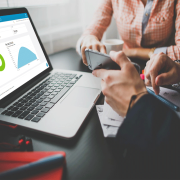Getting a competitive advantage in business today means leveraging technology and talent. Nowhere do these two topics converge quite so poignantly as the discussion of how Millennials are shaping the future of ERP technology. To stay ahead of the market, companies need both their ERP systems, and those who run them, to “operate” efficiently.

So, what influences can we expect the growing job market to have on ERP?
According to this University of Tampa Study, Negotiating the deal: Using technology to reach the Millennials, (Journal of Behavior Studies in Business), Millennials are digital natives who prefer, “tech-centric environments that are active, collaborative, experiential, team-based, and self-paced as possible.”
This is both encouraging and challenging news for ERP developers and implementers. On one hand, Enterprise Resource Planning systems (ERP) gives Millennials the collaborative, team-based experiences and access they respect and prefer.
Millennials will likely take to modern, well implemented ERP systems like fish to water. However, ERPs that use manual workarounds can cause difficulty in training millennials, or create duplicate data will be (understandably) a huge source of frustration to a generation of digital natives.
So, what are some of those expectations?
Millennials want an interface and ERP experience that meets their expectations. This generation has had their tech experiences guided by user friendly applications their entire lives. Dashboards have to push software complexity to the background and be intuitive, hierarchical and user-role centric. Department integration needs to be seamless and communication simple. Document collaboration (think Wiki) and file sharing also needs to be easy. In order to garner respect and cooperation with this workforce, multi-tasking capabilities will also be important, without switching between or shutting down modules and applications.

Digital natives also want to take their tech with them and value working off site and being able to access what they need, when they need it. Mobile tech with full access is a must. With mobile technology, security can be a concern that is why multi-factored authentication is important. According to Doug Johnson of Acumatica, Technical Tuesday: Multi-Factor Authentication via Single Sign-On in Acumatica Cloud ERP, “Security conscious businesses require multi-factor authentication to verify user identities before allowing them to access sensitive ERP data. Acumatica cloud ERP provides mechanisms to support multi-factor authentication to prevent unauthorized system access.”

Perhaps the biggest challenge will simply be anticipating what a new generation of users prefers while simultaneously anticipating how they will change the environment themselves through their contributions. Luckily, no company needs to navigate these waters alone.
Talk to experts like Parallel Solutions about how to choose an ERP system that has the collaborative interface and access your employees want while still maintaining the security you need. Contact Parallel Solutions at (440) 498-9920 to learn about the risks and rewards of various options.




